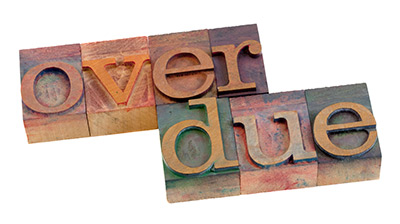How to prevent unpaid invoices from crippling your business
 Simon Carter, director of Touch Financial, looks at how SMEs can avoid unpaid invoices
sending their business to the wall.
Simon Carter, director of Touch Financial, looks at how SMEs can avoid unpaid invoices
sending their business to the wall.
According to a recent PS Finance survey of financial directors and owners of small businesses:
- around 13 per cent have invoices that go unpaid each year
- of all invoices issued, 39 per cent are unlikely to be paid on time
- over 25 hours a week are spent chasing unpaid invoices
- nearly 30 per cent claim that issues with cash flow could result in staff redundancies
- 20 per cent say that unpaid invoices would mean having to refuse new business
Unpaid invoices come about for a variety of reasons, but fundamentally, they occur because of poor credit management. This could be something as simple as not having a purchase order number, or invoicing the wrong legal entity. Then there are disputes – some of them legitimate – for goods or services that have not been properly delivered, or delivered to terms. Some are more nefarious, such as when businesses look to put an invoice into dispute to avoid paying.
What can you do when your customer doesn’t pay?
The starting point is to avoid having a disputed invoice in the first place.
Businesses, and especially smaller businesses, focus a great deal around selling, but rarely put the same energy into thinking about invoicing and collecting debts. Yet it’s the invoicing and collections process that turns promises into cash. So don’t leave it to chance. Get your contractual terms right and ensure that your terms govern the contract before you get to invoice stage. Credit check your customer – a sale is only valuable to you if it is paid for.
Set up a routine for invoicing and collections, including polite reminders before the money is due, and stick to it. Some customers will look out for signs of disorganisation and use them to determine which suppliers they can get away with paying late. Don’t be a victim; do what you can to ensure that you’re at the top of the payments list. If possible, ensure that you:
- understand your customers’ payment processes and systems
- get to know the individuals who deal with invoices
- use a purchase order if needed and ensure that your invoices fit in to their way of working
- check their reputation among other suppliers, and adapt the way you work accordingly
What are your rights to charge interest?
The law gives a supplier the ability to charge interest on overdue payments. Of course, charging valuable customers a punitive rate of interest is easier said than done. Most businesses don’t make use of this right unless their customers are failing businesses, or if the relationship with a customer is damaged beyond repair.
But it’s still useful to clarify, in writing, that you reserve the right to charge interest. Some suppliers even do this automatically when debts become overdue, and invoice their customers for the additional interest right away. The point of this is rarely to actually receive the extra money, but rather to jolt customers into paying on time.
Creative cash flow funding
Of course, best practice in credit management requires a professional resource, and businesses should invest accordingly. Alternatively, you can be more creative by looking at various cash flow funding mechanisms, such as invoice financing (factoring).
Invoice finance is a way of generating cash flow funding that uses your invoices as the principal asset against which money can be raised. This form of business finance takes any unpaid invoices that a company has supplied for its customers on credit, and advances it as a lump sum against those invoices.
The costs involved with invoice finance compare favourably to more traditional forms of lending, such as overdrafts and loans, and can often provide up to 4 times more working capital. This therefore allows your business to take advantage of supplier discounts offered as a result of earlier payments being made, for investment in plant and machinery, or for the general cash flow of the business.
As well as advancing cash, the lender can assume responsibility for managing the sales ledger. It therefore tends to suit businesses that do not have a dedicated in-house credit department, as it provides payment collection services where the weight of a professional third party provider can assist in the collection of debt owed. In effect, it takes the headache of the invoicing and collections process away from the business and puts it into the hands of an expert.
About the author
Simon Carter has over 20 years’ experience at one of the UK's best-known independent invoice finance providers, Touch Financial, which sources funding arrangements for hundreds of businesses every year.
